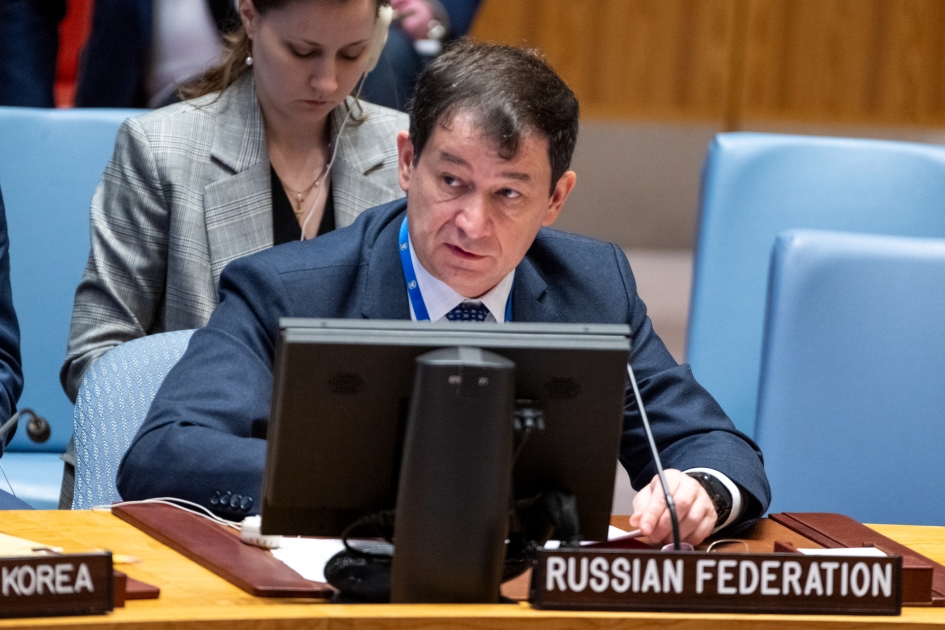Statement by First Deputy Permanent Representative Dmitry Polyanskiy at UNSC briefing on the situation in Libya
Mme.President,
We thank Special Representative of the Secretary-General and Head of the UN Support Mission in Libya (UNSMIL) Abdoulaye Bathily, as well as Permanent Representative of Japan to the United Nations Kazuyuki Yamazaki for their briefings.
It is with unwavering attention that we follow the developments in our brotherly Libya, which undoubtedly have an impact on stability and the security situation in North African, which has still not recovered from the consequences of the tragic events of 2011. Against the backdrop of persisting duality of power in Libya, the prospects for achieving a sustainable settlement are not visible yet. It is clear that ultimately, the country will need a truly inclusive government that will bring together representatives of all regions of the former Jamahiriya. The status quo has remained for far too long. Libyans need to regain faith in the firmness of their state institutions.
The only way out is holding national elections to form unified and inclusive authorities. Last year, members of the Libyan House of Representatives and the High Council of State agreed, within the framework of the 6+6 Committee, on draft laws on the election of the President and the Libyan National Assembly. On 2 October the House of Representatives unanimously approved those draft laws with some amendments. But unfortunately, the electoral situation has not received any developments since then.
Nevertheless, we believe this expertise should be used within the framework of Libya’s political process. We hope that the parties will be able to reach the necessary agreements in the near future. International mediators should actively encourage them to do so.
At the same time, we believe that electoral process should not be furnished with extra conditions and artificial time frames. Besides, it should not exclude political figures that rely on significant support of the population. Again, inclusiveness is the main prerequisite of success.
Mme.President,
We believe that progress in Libya can be achieved only through the joint efforts of all Libyan stakeholders and influential global and regional actors. There is no alternative to the central role of the United Nations as the leading international mediator in Libyan affairs and the role of UNSMIL as a key element of this international configuration.
We closely follow the work of the Special Representative of the Secretary-General in promoting a nationwide political process in Libya. We emphasize our general support for SESG Bathily’s efforts to find acceptable ways of breaking the internal political deadlock and boosting political dialogue. In this matter, it is important to avoid rash steps and intrusiveness. As the Libyan experience shows, attempts to impose a particular agenda on Libyan “heavyweights” do not lead to desired results.
Mme.President,
We welcome the African Union conference on Libyan reconciliation that took place in Brazzaville, Congo, on February 5. We are grateful to the President of the Republic of the Congo, Denis Sassou Nguesso, for organizing the event. It will contribute to restoring national unity in Libya and to reaching consensus on many problematic issues, including those related to the preparation for and convening of presidential and parliamentary elections.
We hope that the all-Libyan national reconciliation conference with the participation of representatives of all political and tribal associations that is planned for April this year will also be a success. We fully support such initiatives, which not only remain relevant but also fit perfectly within the principle of "African solutions to the African problems".
We are concerned over continuing clashes among Libyan armed groups that are reported to take place in some regions of the country. Against this backdrop, the activities of the 5+5 Joint Military Commission remain key to the coordination of the parties at the military track and forming a unified security architecture. Should this – highly sensitive –track lose momentum, it may be fraught with an escalation of the armed confrontation.
As for cancellation of foreign military presence in Libya, we stand for a synchronized, well-balanced, and phased withdrawal of all non-Libyan armed groups and paramilitary formations.
Mme.President,
Before concluding, I would like to call on our colleagues on the Security Council to treat the sanctions toolkit with caution. Most of the UNSC decisions on Libya’s sanctions were adopted primarily to protect its people from violence, criminality and attacks on national funds and never as a punishment. Since then, they have largely become irrelevant and not conducive to national unification, especially now that the reconciliation track gaining momentum. It is high time we thought seriously about revisiting those restrictions.
Libyans have been saying so too, and for quite a long time already. We are convinced that members of the Security Council should take their requests seriously, including those relating to certain aspects of the sanctions regime.
Thank you.
